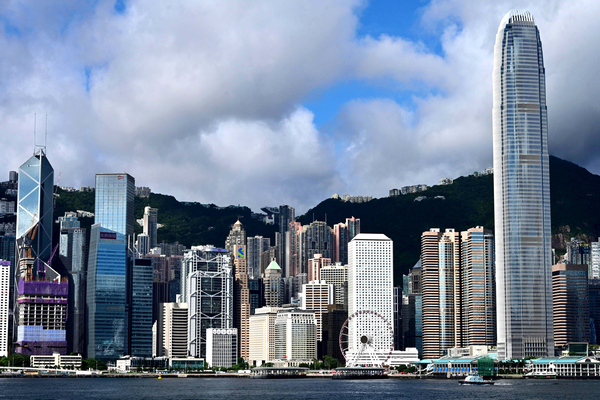Tu Haiming: HK can contribute to and benefit from nation’s ‘new quality productive forces’ ![]()
![]()
By Tu Haiming
When Premier Li Qiang delivered a report at the opening meeting of the second session of the 14th National People’s Congress on Tuesday, he set a GDP growth target of around 5 percent for this year, which implies that China will continue to contribute more than 30 percent of global economic growth. In the face of a capricious global landscape, China’s relatively robust economic growth this year will inject a strong impetus to the world economy, and provide enormous opportunities for Hong Kong’s development.
In his report, Li indicated that the country will strive to modernize its industrial system and develop new quality productive forces at a faster pace; and he enumerated some key industries and pointed out the appropriate policy direction.
“Developing new quality productive forces at a faster pace” is a “big game” that will involve numerous industrial policies, which are expected to be rolled out one after another. Hong Kong has a lot to offer in this respect, thanks to its solid scientific research foundation and world-leading capacity in some areas of research. Hong Kong should take bold initiatives that align with the central government’s policy priorities and cooperate with Chinese mainland partners in order to promote the country’s “new quality productive” development campaign while strengthening and expanding the city’s own industries.
Domestic consumption expansion brings opportunities
In his report, Li said the country will integrate the strategy of expanding domestic demand with the efforts aimed at deepening supply-side structural reform, and guide consumption and investment more strategically, so as to boost the economy’s vitality.
Li’s report offers masses of information, covering numerous policies and measures that herald boundless opportunities. Hong Kong can get on board the “express train” of national development by dovetailing its development strategy with national strategy
Li underscored three ways to promote growth in consumer spending. First is to unlock potential demand by increasing people’s incomes, optimizing the supply of products and services, and reducing restrictions. Second is to develop new patterns of consumption, introducing policies to promote digital consumption, green consumption and health-promoting consumption, as well as stimulate consumption on smart-home products, entertainment, tourism and cultural products. Third is to strengthen traditional consumption by promoting consumer goods trade-in, and boosting expenditure on new-energy vehicles, electronic products and other big-ticket items.
Hong Kong has strived to develop the Chinese mainland’s consumption market. It can seek further support from the central government in this regard. The central government’s pronounced strategy to promote domestic consumption heralds huge opportunities for Hong Kong’s enterprises to tap into the mainland market.
The rising living standard of people on the mainland has facilitated consumption upgrading, spawning new consumption patterns, such as caravanning, cosmetic surgery, medical rehabilitation and healthcare, which are creating tremendous market potential. The central government’s quest for developing new patterns of consumption is instructive for Hong Kong enterprises, which are expected to explore cooperative opportunities with their mainland partners.
The policy of promoting consumer goods trade-in is also expected to boost consumption, benefitting industries such as appliances and automobiles. How Hong Kong can benefit from this policy by investing in relevant mainland industries is worth exploring.
HK should contribute to high-level opening up
Premier Li pledged in his report that China will proactively promote alignment with international rules and practices on economic and trade activities, and try to gain new strengths in international economic cooperation and competition.
He highlighted three policy directions: stabilizing the volume while raising the quality of foreign trade; intensifying efforts to attract foreign investments; and promoting high-quality cooperation under the Belt and Road Initiative (BRI). All three national endeavors bode well for Hong Kong’s future economic development.
Li indicated that the country will make efforts to optimize the positioning of overseas warehouses to stabilize trade volume and raise the quality of foreign trade. China is a trade power; it is imperative for the country to explore ways to reduce costs, mitigate risks and improve trade efficiency. Here is where Hong Kong’s status as an international trade center, an international shipping center and an entrepot between the Chinese mainland and the rest of the world comes into play.
Li said that all market access restrictions on foreign investment in the manufacturing sector will be abolished to attract foreign investment, and that market access restrictions in service sectors, such as telecommunications and healthcare, will be reduced. Hong Kong’s world-class healthcare services have earned the recognition of mainland residents over the years. Reducing market access restrictions presents a great opportunity for Hong Kong’s healthcare services to tap into the huge mainland market, starting from the Guangdong-Hong Kong-Macao Greater Bay Area.
In explaining how the country will promote high-quality BRI cooperation, Li said that China will steadily advance cooperation on major projects and implement a number of “small and beautiful” projects for improving people’s well-being. The BRI creates huge opportunities for countries and regions along the route. Last year, HKSAR Chief Executive John Lee Ka-chiu led a delegation of government officials and businesspeople to visit the Middle East and Southeast Asia; those two business promotion trips have borne fruit — attracting a number of major IPOs for the Hong Kong stock exchange. While striving to seize the opportunities offered by major projects, Hong Kong must not let go of the opportunities brought by “small and beautiful” projects. The city can make use of its advantages such as expertise in international trade, strong international connectivity and superb financial services in promoting these mainland-sponsored projects.
The author is vice-chairman of the Committee on Liaison with Hong Kong, Macao, Taiwan and Overseas Chinese of the National Committee of the Chinese People’s Political Consultative Conference and chairman of the Hong Kong New Era Development Thinktank.
The views do not necessarily reflect those of Bauhinia Magazine.
Source: China Daily
https://res.youuu.com/zjres/2024/3/9/8y58vEzEQtHlyaxX5ApSFe7oCbuBlFzDHUr.jpg











扫描二维码分享到手机














